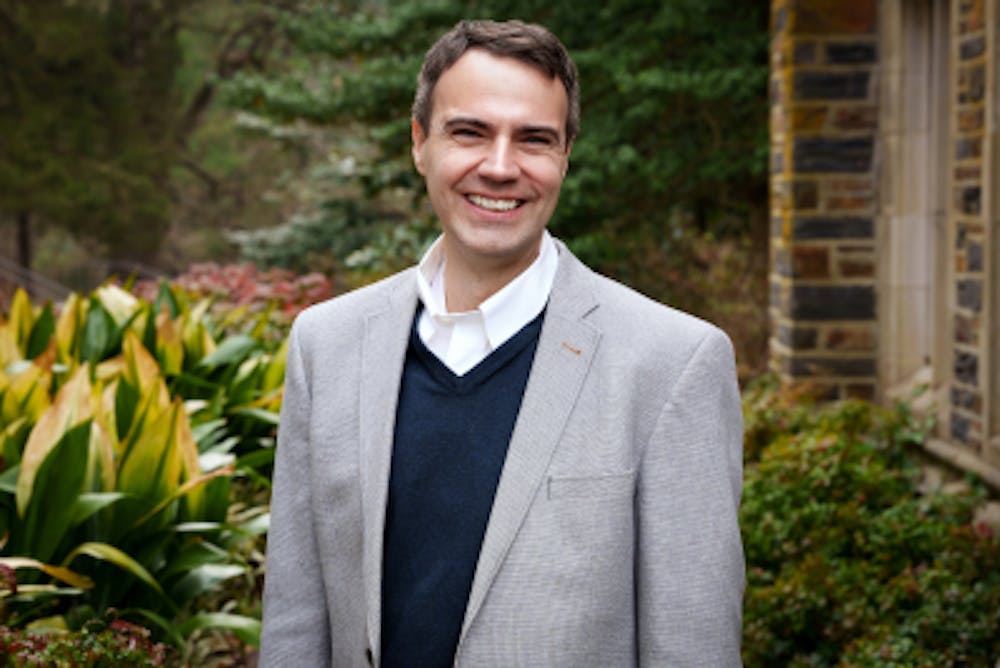Justin Wright, associate professor of biology at the Nicholas School of the Environment, will begin a new role as the graduate dean for the Trinity College of Arts & Sciences on Friday.
In explaining his hopes for the position, Wright first emphasized the often underestimated role of master’s and doctoral students in the Duke undergraduate experience.
“I think it's important to recognize that graduate students really are a critical part of the University as a whole,” Wright said. “From the undergraduates’ perspective, they're most often your [teaching assistants] or sometimes even your teachers, so they have a really important role in education. And they also have a really important role in the research that's kind of the heart of the University enterprise.”
As the graduate dean, Wright will oversee graduate education within Trinity, focusing on three main aspects: finances, mentorship and culture.
“There’s a lot of complicated ways that money moves around to figure out how graduate students are paid for. I'm not a financial expert, but that's one of the things that I'm helping to keep track of,” Wright said, referencing his financial aspect of focus. Graduate students are compensated for teaching and research assistantships, and that money is separate from the external or departmental funding doctoral students may receive to cover expenses.
With regards to mentorship, he intends to “make sure that graduate systems are receiving good mentorship from their faculty advisors” and that “our students are getting the best training they can get.”
Wright admired the many initiatives that his predecessor Neil McWilliam implemented, including a peer mentorship program in which graduate students could become mentors for other graduate students. McWilliam, Walter H. Annenberg Distinguished Professor of art and art history, was the first person to take on the role of graduate dean of Trinity in 2020, a time when many of his efforts needed to be COVID-19-related.
As Duke moves past the pandemic, Wright is looking forward to having “more time to consider things that [McWilliam] didn't have the opportunity to take on,” he said.
“In particular, thinking about the culture side, how do we make it clear that Duke is really a place that welcomes people from all backgrounds?” he said. “It's challenging when you have people, graduate students, who might be coming in, and for whatever reasons, do not know how graduate school works. There's a lot of unwritten rules about education, and one of my big priorities is to make those unwritten rules more written so that everyone is on equal footing and understands what is expected of them.”
Since Wright already has experience working in Duke’s biology department, he is excited to learn more about the other facets of Duke.
“One of the amazing things about Duke is that there are so many brilliant people working in so many areas,” Wright said. “I know everything that's going on in biology, but this is a chance to lift my head up and look around and see a lot more of the University. That's really exciting.”
Although this learning curve is what Wright is most excited for with the new role, it is also what he is most nervous about.
“There's just a tremendous amount to learn about how the University works. This is a big change in what I do,” Wright said. “You know, my life up until now has been a teacher and a researcher with a little bit of administration, and now it's going to be a lot more administration, and that's not something that when you get your [doctoral degree] you receive a whole lot of training in.”
In a message to Trinity faculty and staff, Trinity Dean Valerie Ashby, who appointed Wright, commended his qualifications and character.
“I have always been impressed by the way [Wright] listens closely to his colleagues, respects disciplinary differences, and takes time to formulate his own thoughts before taking a position on any subject,” Ashby wrote. “He has also demonstrated his commitment to excellence in graduate education and always puts our students first.”
Get The Chronicle straight to your inbox
Sign up for our weekly newsletter. Cancel at any time.

Madeleine Berger is a Trinity senior and an editor at large of The Chronicle's 119th volume.

